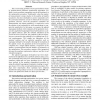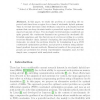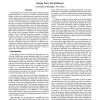79 search results - page 2 / 16 » An adjoint method for second-order switching time optimizati... |
ICCAD
1997
IEEE
13 years 9 months ago
1997
IEEE
The circuit tuning problem is best approached by means of gradient-based nonlinear optimization algorithms. For large circuits, gradient computation can be the bottleneck in the o...
ICCAD
2008
IEEE
14 years 2 months ago
2008
IEEE
Abstract— This paper presents an allocation method of decoupling capacitance that explicitly considers timing. We have found and focused that decap does not necessarily improve a...
DAC
1998
ACM
13 years 9 months ago
1998
ACM
This paper presents a general method for computing transient sensitivities using the adjoint method in event driven simulation algorithms that employ piecewise linear device model...
HYBRID
2005
Springer
13 years 10 months ago
2005
Springer
Abstract. In this paper, we study the problem of controlling the expected exit time from a region for a class of stochastic hybrid systems. That is, we find the least costly feedb...
ASPDAC
2007
ACM
13 years 9 months ago
2007
ACM
Power supply noise increases the circuit delay, which may lead to performance failure of a design. Decoupling capacitance (decap) addition is effective in reducing the power suppl...



